Does Bat Size “Drop” Affect Swing Performance For Baseball & Softball? | Adult, High School, & T-Ball | Weight Length Dimensions Chart & Calculator Experiment
Discover how bat size “drop” (bat length minus bat weight) affects performance for baseball and softball hitters in this swing experiment. It’ll bring perspective to choosing an adult league, High School, or t-ball bat. CLICK HERE for a fantastic weight-length dimensions chart calculator resource by body weight and age.
Question: How is Bat & Ball Exit Speed Affected by Bat Size?
In this baseball swing tips experiment using the BlastMotion Baseball app, I wanted to use the Scientific Method to analyze what would happen to Bat Speed at Impact and Ball Exit Speed if I used a Mizuno Generation 33-inch, 30-ounce BBCOR versus a 34-inches, 31-ounces, same model.
Background Research
CLICK HERE for an article titled “The Physics of Baseball”. Read under the subhead titled, “Swing speed vs. bat weight”.
The following information I received from a long time PocketRadar rep. It’s what he does for a living.
In this baseball swing tips Mizuno Generation bat experiment, a good rule of thumb when looking at ball exit speed is:
A 1-mph of ball exit speed (BES) increase, adds 4-feet of distance to a batted ball (a 1:4 ratio).
So for instance, if an 9 year old hits the ball with 50-mph of ball exit speed, then they have the capability of hitting the ball 200-feet (50 X 4 = 200).
On the professional side of things, I’ve heard that scouts are actively looking for 95-mph+ ball exit speed in games because that hitter has the ability to hit the ball at least 380-feet. That’s hitting the ball out down the lines, and to the gaps, at most ballparks.
It’s also interesting to note that you can add about 5-15-mph to ball exit speeds taken off a tee, to simulate what it would be in a game. That extra 5-15-mph will depend on the pitcher’s velocity.
SCIENCE-BASED TRAINING:
Improve your hitting strategy dramatically by applying human movement principles.
Learn not only how and what to train but also the science behind the methods.
Hypothesis
Based on the above baseball swing tips experiment research, I think swinging with the Mizuno Generation 34/31 will, on average, increase my ball exit speed. I think that my bat speed will come down a bit using the 34/31 over the 33/30 because of the added weight and length. Also, “trading up” a bat size will depend on how much forward momentum a hitter uses. The less FoMo, the harder it will be to trade up.
Baseball Swing Tips Mizuno Generation Bat Size Experiment
Equipment Used:
- BlastMotion Baseball app
,
- Backspin Batting Tee
,
- Flip camera
,
- Bushnell radar gun
, and
- 2 Mizuno Generation BBCOR Baseball Bat
(-3) Model #340252, sizes: 34/31 & 33/30
Setup:
- A friend of mine, Juan Ortiz, took Ball Exit Speed gun readings while inputting into this Google Doc spreadsheet.
- You’ll notice on the baseball swing tips experiment spreadsheet that there are missing numbers, these were radar gun mis-reads (where the radar gun lost coverage of the batted ball’s trajectory). We eliminated ten mis-reads using the 33/30, and thirteen mis-reads using the 34/31. We then adjusted the average swings in each test. For instance, we eliminated 13 mis-reads using the 34/31, so spreadsheet added all swing ball exit speeds for that test, then divided by 87 total swings.
- However, the Zepp app readings were all averaged over 100 total swings.
- Dimple ball feedback markers were set at the bat’s length plus two baseballs
- The two tests in the experiment were counter-balanced. Which consisted of eight blocks of 25-swings done in the following order ABBA BAAB. “33/31 Mizuno bat swings” were letter ‘A’, and
“34/31 Mizuno bat swings” were letter ‘B’. 200 total swings were completed in the experiment, 100 per test. Counter-balancing helps remove the “getting tired” and “not being warmed” up factors. - Now, we took readings with the Zepp app and with the Bushnell radar gun. Please note, these aren’t an apples to apples comparison, so we’ll be looking at them in separate detail.
Data Collected (Zepp Baseball App):

Check out the little baseball swing tips experiment changes in average Bat Speed Impact & Time To Impact…
Data Analysis & Conclusion
- Zepp app findings – as you can see, there was an average increase of 1-mph in Bat Speed at Impact using the 34/31 Mizuno Generation bat.
- Zepp app findings – there was also average 0.057 sec drop in Time To Impact with the 34/31 Mizuno Gen. bat.
- Bushnell BES radar gun findings (Google Doc) – there was an average Ball Exit Speed increase of 2-mph when using the 34/31 Mizuno Gen. bat.
Notes
- I did not expect to see a major difference in Time To Impact like we did in the baseball swing tips bat size experiment.
- I thought that average Bat Speed at Impact when using the 34/31 Mizuno Gen. bat was going to be less than the 33/30, but it actually increased by 1-mph!
- In looking at the BES Google Doc spreadsheet, I topped out at 95-mph (twice) using the 33/30. And topped out at 94-mph using the 34/31. Btw, a week prior, one of my 12yo hitters wanted to see what “Coach Joey” could hit in ball exit speed. And after about 5-6 swings, I hit 92-mph off the tee with wood. Not tooting my own horn here, just interesting to see a ballpark difference between wood and the Mizuno Gen. BBCOR bats. Also, I’m only 5’10” on a “good day”, and 165-pounds. Add about 10-mph in a game, and I’m hitting 102-mph BES, which translates to 408-feet of batted ball distance. My point is, you don’t have to be a big hitter to crush the ball B-)
- What else is interesting in looking at the baseball swing tips experiment spreadsheet, that after about 75 total experiment swings, I started to consistently hit more 90+mph’s and find my highest BES readings. Similar to how many pitches it takes a pitcher to actually “get warm”. This is why we counter-balance the experiments now, to sidestep the “warm-up factor”.
The Bottom Line?
In this baseball swing tips experiment, using two different sized Mizuno Generation -3 BBCOR bats, we found that (for me), the 34/31 added 1-mph of Bat Speed at Impact and 2-mph to Ball Exit Speed, on average. I was amazed to learn that using the bigger bat actually cut down on Time to Impact. Some interesting findings and ones I hope others will test for themselves in the future. My parents ask me the “bat size” question all the time. So, by investing in a Bushnell radar gun or PocketRadar gun
, you can gather some pretty convincing data as to which bat to use.
- Fix Your Child’s Fear of the Ball Fast: Proven Hitting Drills to Stop Flinching at Pitches—Trusted by Top Youth Baseball Coaches - July 12, 2025
- Fix Your Little Leaguer’s Hitting Slump Fast – Proven Confidence Drills & Mental Reset Tools (Used by Top Youth Baseball Coaches) - July 9, 2025
- Best Hitting Drills for 8-Year-Olds (2025): Fix Swing Flaws Fast with This MLB-Trusted Youth Baseball System—At-Home, Step-by-Step, and Built for Game-Day Confidence - July 5, 2025


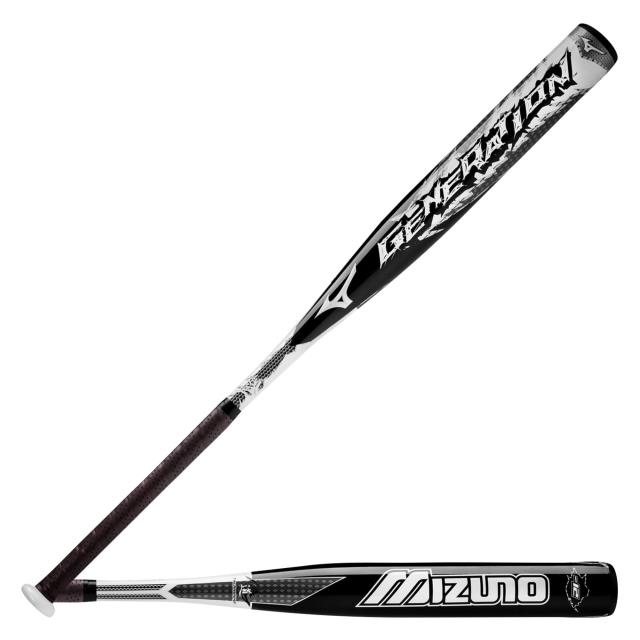

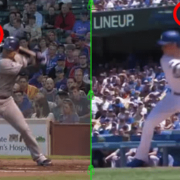
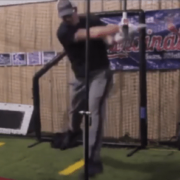
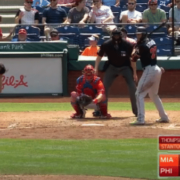
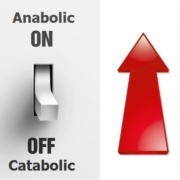

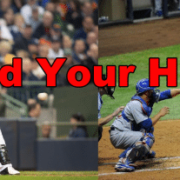





Interesting!!
Joey – What is your theory on the increase in bat speed and decrease in time to impact with a heavier bat? Seems pretty counter-intuitive!
Maybe you use your big muscles better and unweight the bat better to stay efficient with the heavier one?
Matt, I think you’re right. Maybe I subconsciously un-weighted more with the heavier bat. One of my readers emailed me and thought maybe the weight of the bat dropped into the zone faster. I dunno. Further tests will definitely have to be done. This is a relatively small sample size, 200 total swings.
Joey,
I’ve measured my students using smaller bats vs larger bats. Typically I see very little change if at all in speeds. I use a lot of golf analysis when I make Swing comparisons. But definitely a longer club with the same loft creates more speed. It would be like choking down and taking your normal swing but trying to fly the ball about 5 yards less than normal. The actual gain in speed would come from a longer swing circle. Since it is traveling faster, the barrel gets to contact quicker. As for the increase in weight, one ounce doesn’t usually affect the hitter. I think it’s all about swing weight of the club. Where is the weight distributed? Is the weight on the end or is the bat balanced. On that note, I think that most kids could benefit from going bigger. My daughter was one of the best hitters on her HS team that won 2 state Championships. I was looking at her stats just a couple of days ago, mostly her HRs each year. Fresh yr she used a 32/22 Demarini (1). Sof yr 33/23 Demarini (2) JR yr 33/23 Easton Stealth (2). Sr yr 34/24 Easton (10). Maybe a lot has to do with natural physical growth but she didn’t grow an inch in 4 years. Major league hitters hit the ball a long ways but look at their bats and notice how much bigger they are compared to HS and College. I think it’s a mental thing and once the hitter gets past the point of their own comfort level, off they go. Thanks Joey
Coach DeLong
Coach DeLong, I’m right there with ya! And according to Physicist Dr. Alan Nathan, he says the bat’s MOI (Moment Of Inertia – where the center mass of the bat is located) has more to do with increasing Ball Exit Speeds than size or weight of the bat. In other words, with all things being equal, top heavy bat (MOI closer to end) will produce higher Ball Exit Speeds than balance weighted (MOI closer to hands) ones.